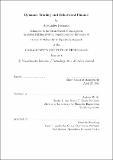Dynamic trading and behavioral finance
Author(s)
Remorov, Alexander
DownloadFull printable version (8.180Mb)
Other Contributors
Massachusetts Institute of Technology. Operations Research Center.
Advisor
Andrew W. Lo.
Terms of use
Metadata
Show full item recordAbstract
The problem of investing over time remains an important open question, considering the recent large moves in the markets, such as the Financial Crisis of 2008, the subsequent rally in equities, and the decline in commodities over the past two years. We study this problem from three aspects. The first aspect lies in analyzing a particular dynamic strategy, called the stop-loss strategy. We derive closed-form expressions for the strategy returns while accounting for serial correlation and transactions costs. When applied to a large sample of individual U.S. stocks, we show that tight stop-loss strategies tend to underperform the buy-and- hold policy due to excessive trading costs. Outperformance is possible for stocks with sufficiently high serial correlation in returns. Certain strategies succeed at reducing downside risk, but not substantially. We also look at optimizing the stop-loss level for a class of these strategies. The second approach is more behavioral in nature and aims to elicit how various market players expect to react to large changes in asset prices. We use a global survey of individual investors, financial advisors, and institutional investors to do this. We find that most institutional investors expect to exhibit highly contrarian reactions to past returns in terms of their equity allocations. Financial advisors are also mostly contrarian; a few of them demonstrate passive behavior. In contrast, individual investors are, on average, extrapolative, and can be partitioned into four distinct types: passive investors, risk avoiders, extrapolators, and everyone else. The third part of the thesis studies how people actually trade. We propose a new model of dynamic trading in which an investor is affected by behavioral heuristics, and carry out extensive simulations to understand how the heuristics affect portfolio performance. We propose an MCMC algorithm that is reasonably successful at estimating model parameters from simulated data, and look at the predictive ability of the model. We also provide preliminary results from looking at trading data obtained from a brokerage firm. We focus on understanding how people trade their portfolios conditional on past returns at various horizons, as well as on past trading behavior.
Description
Thesis: Ph. D., Massachusetts Institute of Technology, Sloan School of Management, Operations Research Center, 2016. This electronic version was submitted by the student author. The certified thesis is available in the Institute Archives and Special Collections. Cataloged from student-submitted PDF version of thesis. Includes bibliographical references (pages 198-204).
Date issued
2016Department
Massachusetts Institute of Technology. Operations Research Center; Sloan School of ManagementPublisher
Massachusetts Institute of Technology
Keywords
Operations Research Center.